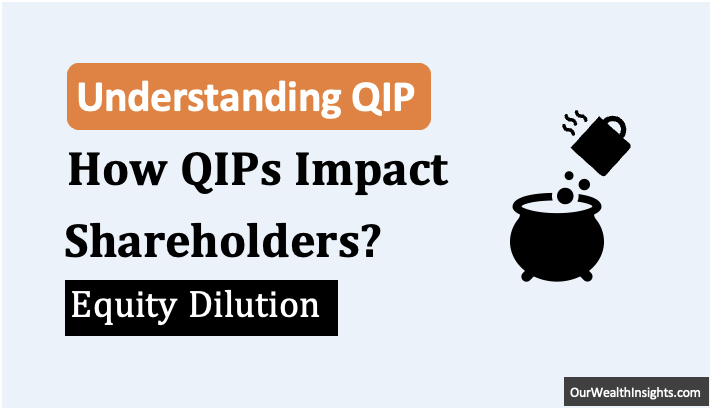QIP Dilution Calculator
Analyze the impact of a Qip on your shares with precision.
Introduction
As a regular investment in the stock market, I’ve a fair bit of experience with shares. But when it comes to Shares dilutionI’ve often find it hard to understand its Occurrences. Perhaps, I did not had the required understanding of the case, hence was confused.
Recently, I came across news About Ireda raising Rs.2,005.90 Crore through a Qualified Institutional Placement (QIP)It got me curious.
- What’s a QIP?
- How does it affect us as shareholders?
- Why do companies do this?
So, let’s Dive Ireda’s QIP and Unpack Itp-by-Step. My goal is to explain the qip from an angle which is not often covered by finance portals or books on the topic.
But let’s first start with the basics:
1. What is A QIP?
A Qualified Institutional Placement (QIP) is a way for listed companies in India to Raise Money,
Companies Issue New Equity Shares to Big Investors Like Mutual Funds, Banks, or Insurance Companies. These investors are called Qualified Institutional Buyers (QIBS),
It is like a company seling fresh shares to heavyweights but not to regular folks (retail investors) like us.
Ireda, A Public Sector Company Focused on Green Financing Raised Funds Via Qip in June 2025.
- They Issued 12.15 Crore New Shares at Rs.165.14 Each,
- What was the result?
- A Sum Total of Rs.2,005.90 Crore Came in the Bank Account of Ireda.
But here’s the catch, Issuing new shares changes things for existing sharehlders, and this is the thing I want to highlight in this blog post.
Let’s see how.
2. Why Companies Need A Qip?
Companies don’t just issue shares for fun. They need funds for growth, debt repayment, or new projects.
For Ireda, it’s all about Green Financing,
They lend money For renewable energy projects like solar and wind farms. The rs.2,005.90 Crore from the Qip will help them fund more such projects. More projects mean more revenue? That’s the long term plan.
As a psu, reda has the government’s backing.
This makes their Qip a safe bet for big investors.
Hence, this qip was oversubscribed 1.34 timesMeaning Qibs Were Eager to Grab that Shares.
Lic alone took 50% of the shares. When such a large institution participate so heavily in a company’s qip, it treated like a Vote of confidence in favorite in favor of the company.
Now, my confusion was, isesuing shares to Qibs is fine, But who are selling their shares to Qibs? Are promoters seling their shares or who,
Let’s answer it in the next part.
3. Where do these new shares come from?
This was my big question whenever I read about QIPS or Similar Share Dilution Events.
- Is the company Selling their own shares
- Or the institution or retail investors Are selling their shares?
To my surprise the answer is neither.
None of my options was valid. INTEAD, The shares are freshly created by the company,
It’s like a bakery making new cakes, not selling the ones already on the shelf.
But there’s a limit. Companies, Cannot Create and Sell Endless Amount of Shares,
Every company has an Authorized Share Capital in its Memorandum of Association (Moa)This is the maximum number of shares it can issue.
For Ireda, Their Authorized Capital was enough to issue 12.15 Crore New Shares,
If it wasn’t, they’d have to amend their moa, which we’ll talk about later (This is also an interesting fact about the company’s act in India – Read here,
But before that, let’s understand how QIPS can effect the shareholding pattern of the company and hence its existing sharehlders.
4. How does a Qip change the shareholding pattern?
- Before the QIPIreda Had 268.77 Crore SharesWith a paid-up capital of Rs.2,687 Crore (Face Value ₹ 10 per share).
- After the Qip, where they are Issued 12.15 Crore new shares, the total shares jumped to 280.92 Crore Numbers (= 268.77 + 12.15), and the Paid-Up Capital Became Rs.2,809 Crore.
What does this mean for shareholders?
Suppose you own 1% of reda, or 2.6877 crore shares, before the QIP. After the QIP, your shares in the portfolio styed the same. But the total shares outstanding in the market has increased (new 12.15 shares was Issured).
This means, your ownership drops to about 0.9568% (from 1%). That’s a 4.32% dilution of your stake. This is what is called as shares dilution.
- Before QIP: 2.6877 / 268.77 = 1%
- After QIP: 2.6877 / 280.92 = 0.9568%
The same thing happy for every shareholder of the company.
- The Government of India.
- Retail investors And others Faced Similar Dilution.
But who was the benefit of the QIP? The recipient of the new shares. The beneficiary was Qibs like lic.
So you can see, How Issuing New Shares Like QIPS, Bonus Issue, Esops, Rights IssueEtc can dilute the holding of existing shareholders.
So this brings us to the next logical question, can a company keep issues shares at their free will?
5. Can Companies Keep Issuing Shares Forever?
Not really. The authorized share capital sets a cap.
For Ireda, it was enough for this QIP.
But suppose there is a company who needs more shares (for raising capital through equity route) but they have no southorized shares left. What such a company can do? They Amed their moa to increase the authorized capital.
Moreover, moa amendment is not too hard but involves steps.
- First, The Board Approves the Increase.
- Then, shareholders Vote in a General MeetingNeeding 75% Approval.
- Finally, The Company Files Form Sh-7 with the Registrar of Companies (Roc),
This process takes 1-2 months and costs some feet. For a psu like Ireda, with Government Support, It’s Fairly Smooth.
So what does it mean? If a company wants, they can issue endless numbers of shares through the moa amendment route.
In India, listed companies and psus amend their moa oftenI think, about 10-20% of bse-listed firms do it year for fundraising or expansion. It’s common but experts say that it is not endless (I do not agree, I think it is endless). But this is also atto true that Responsible Management Would Never Endlessly Dilute The Holding of their existing shareholders.
6. Is Ireda’s QIP Good or Bad for Existing Investors?
At first glass, the 4.32% dilution feels like a loss.
If Ireda’s Profits Do’s Grow (Over Say Next 4 Quarters), The Earnings Per Share (EPS) Would Dip. This will be also potentially take the share price down in time to come (long term).
But in Shor Term, Taking Example of Ireda, The Qip Price was.165.14. This was 5% discount to the floor price. Which i think was the reason that caused a short-term stock price drop.
But i think, qip isn’t all bad (Especially True for Quality Companies).
Lets’ Undrstand it using Ireda’s Example.
The rs.2,005.90 Crore strengthens reda’s ability to fund green projects. India’s renewable energy sector is booming, and reda is at the heart of it. More projects could mean more Profits, which could boost EPS and Stock Pris Over Time.
Plus, when big names like lic and morgan stanley owns shares of a company, it add to their credibility. Their involvement can stabilize the stock and improve governance.
For long-term investors, this could outweigh the immediati dilution pain,
Conclusion
The dilution stings a bit, especially for retail investors like us.
But the funds that’S beig generated from Qip, if Used Wisely, will lead to future growth. If the company plays their cards right, fund raise in qips out be a win for long-term shareholders.
You can now use the Above Qip Dilution Calculator to get more personal or Read the faqs For Shorter and More Specific Answers.
FAQS
A qip is a method for a listed company by Issuing new equity shares or converted seconds exclusively to qualified institutional buyers (QIBS). Unlike a public issue, it is a faster process with fewer regulatory hurdles. It targets only Sophisticated Institutional Investors Like Mutual Funds, Banks, and Insurance Companies (EG, LIC, Morgan Stanley, Society, Socie General in Ineda’s Case). The primary goal of quip is to raise funds efficiently with significantly diluting control or undergoing a lengthy public offering
In a QIP, the company creates and issues entryly new equity shares. The company’s board and shareholders approve the creation of these fresh shares, which are then allotted to QIBS. Consequently, the company’s Total Shares Outstanding Increase,
Yes, A QIP Fundamentally Changes A Company’s ShareHolding Pattern Secause It Increases The Total Number of Shares Outstanding.
A qip is not inharently harmful to existing investors. Immedited, it causes equity dilution and can temporarily impact the EPS and Stock Price. However, the funds raised can strengthen the company’s financial position and future future growth. If the capital is deployed effectively, it can lead to higher future profit and ePS, Ultimately Benefiting Sharehlders in the long term.
For Establed Companies like Ireda, Amending the Moa to Increase Authorized Share Capital is Moderately Easy But Proced three.
(Tagstotranslate) Equity Dilution (T) Ireda QIP 2025 (T) QIP India

